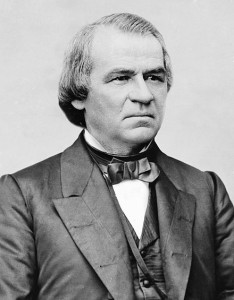I think I see some similarities between the Democrats’ apparent efforts to try to impeach President Trump and the impeachment of Andrew Johnson in 1868.
Andrew Johnson was a “war Democrat,” meaning that he was a Democrat who supported the Union. He was Governor of the border state of Tennessee. Lincoln considered the border states critical in saving the Union.
“I hope to have God on my side,” Abraham Lincoln is reported to have said early in the war, “but I must have Kentucky.” Unlike most of his contemporaries, Lincoln hesitated to invoke divine sanction of human causes, but his wry comment unerringly acknowledged the critical importance of the border states to the Union cause. Following the attack on Fort Sumter and Lincoln’s call for troops in April 1861, public opinion in Maryland, Kentucky, and Missouri was sharply divided and these states’ ultimate allegiance uncertain. The residents of the border were torn between their close cultural ties with the South, on the one hand, and their long tradition of Unionism and political moderation on the other.
In 1864, after Atlanta was taken by Sherman, Lincoln began to think about the situation after the war. He met with Sherman and Grant on March 28, 1865. He had two weeks to live. He talked to them about his plans for after the war ended. Sherman later described the conversation. Lincoln was ready for the post-war period and he told Sherman to assure the Confederate Governor of North Carolina that as soon as the army laid down its arms, all citizens would have their rights restored and the state government would resume civil measures de facto until Congress could make permanent arrangement.
In choosing Johnson as his VP in 1964, Lincoln was doing two things, he was supporting his argument that no state could secede from the Union. The radical Republicans like Stevens and Sumner had taken the position that states had “committed suicide” by seceding. There was even a movement at the Baltimore Convention to nominate someone else, like Fremont who had been the nominee in 1856. The other was allowing the Convention to choose the VP nominee. It did seat some delegations from states, like Tennessee, that were still the scene of fighting. Only South Carolina was excluded.
The Convention was actually assumed to be safe for a Hannibal Hamlin renomination. Instead it voted for Johnson by a large margin. The final ballot results were 494 for Johnson, 9 for Hamlin. Noah Brooks, a Lincoln intimate, later recounted a conversation in which Lincoln told him that there might be an advantage in having a War Democrat as VP. Others, including Ward Hill Lamon, later agreed that Lincoln preferred a border state nominee for VP.
An so, Andrew Johnson, a War Democrat, was elected to an office that no one ever considered as likely to become President. No one anticipated Lincoln’s assassination. However there was a significant segment of radical Republicans that wanted to punish the states that had seceded and those who had joined the Confederacy, contrary to Lincoln’s plans. He had intended to restore the local governments, pending Congressional action to restructure the state governments. The Convention was well before Atlanta fell to Sherman’s army and Lincoln was not convinced he would be re-elected. The War Democrat VP nominee would help with border states.
Johnson humiliated himself with his inauguration speech, at which he was suspected to be drunk. He may have been ill; Castel cited typhoid fever,[95] though Gordon-Reed notes that there is no independent evidence for that diagnosis
Six weeks later, Lincoln was assassinated. Johnson was not well prepared to assume the Presidency.
